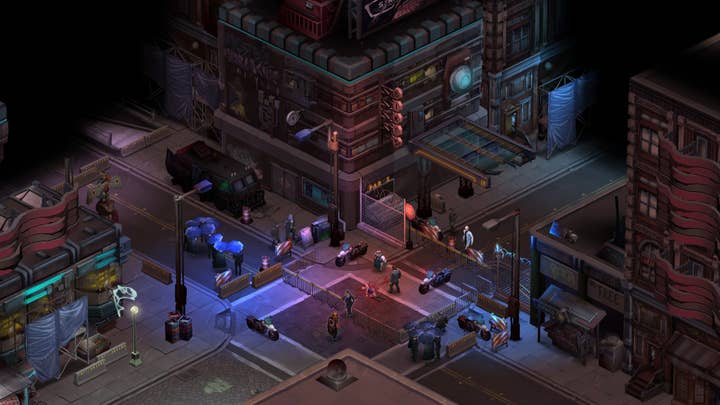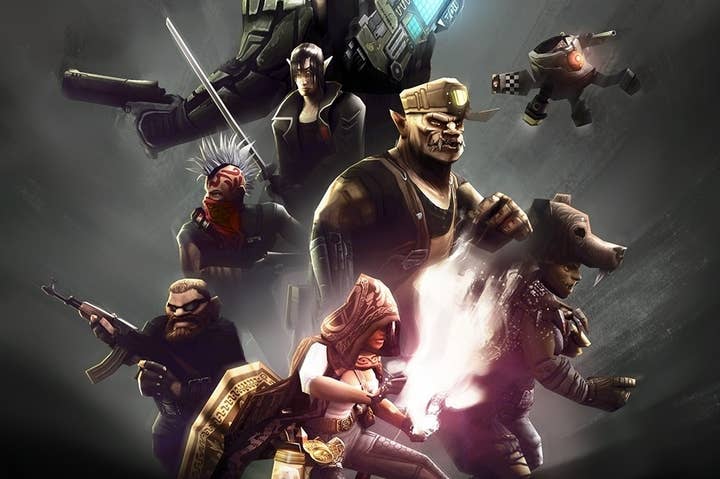Shadowrun dev prepping return to Kickstarter
Harebrained Schemes' Mitch Gitelman on what went right, what went wrong when fans could see "how the sausage gets made"
When the Kickstarter wave formed, Shadowrun Returns was on the crest, right alongside Wasteland 2 and Double Fine Adventure as new projects from veteran developers that far outstripped their initial funding goals. However, it will also be the highest profile title yet from that generation of projects to see release, as backers have already been sent Steam unlock keys and a July 25 launch has been nailed down. With the game all but released, GamesIndustry International spoke with executive producer Mitch Gitelman to discuss what insights and learnings he has to share as the first of 2012's big-name Kickstarters to cross the finish line.
While Gitelman struggled to come up with any regrets about the way Harebrained Schemes handled the Kickstarter and subsequent development of the game, he readily admitted that if he had it all to do over again, there would be some changes.
"We didn't know what we were doing, exactly," Gitleman explained of the Kickstarter project. "There were no lectures about it at GDC or anything. So yes, I would do it differently. We didn't plan out stretch goals the way this generation of Kickstarters does. We added them organically, and we didn't have some master plan on how to roll them out."
Instead, Harebrained developers combed the Internet looking for forum chatter from Shadowrun fans and potential backers, just to see what they were discussing amongst themselves. The team then made its decisions on stretch goals based largely on what seemed to be exciting the backers, trying to capitalize on that enthusiasm so long as it didn't undermine the game.

"It was a very organic, and very, for lack of a better word, 'customer-oriented' approach, which I'm kind of proud of," Gitelman said. "But from a planning point of view, the executive in me says something different. And the designer in me says something different."
While Gitelman says he has no problem telling his inner executive to go sit in a corner, he is not so disciplined when it comes to design issues. As an example, he brought up the decision to go from a top-down 2D game to a 2D-3D hybrid with an isometric viewpoint as one with cascading consequences for development.
"That one decision right there added amazing complexity and cost to the development, that one decision more than any other," Gitelman said. Beyond the greater demands on the art team, the user interface was similarly complicated by the switch, impacting things like line-of-sight calculations.
"I think there's an element where you don't really want to know how the sausage is made; you just want to know it tastes good."
Mitch Gitelman
Between the change in perspective and the assortment of stretch goals tacked on when the game more than quadrupled its initial $400,000 asking price, Gitelman said the scope increased to the point where the game would be unable to meet its original January 2013 release date. Gitelman wasn't too broken up about that, noting, "A game's only late until it ships, and a good game is a good game forever, hopefully."
While Shadowrun Returns isn't the only Kickstarter game to miss its originally planned release date, Gitelman doesn't believe these crowdfunded projects are running into operational difficulties at a rate any different from normal game development.
"It's one thing to make a game for a publisher where it's very secret until you finally announce it X amount of weeks or months before ship when you want to get the rolling thunder of marketing going," Gitelman said. "It's another thing to make a game in a fishbowl where everybody can see everything you're doing. And a lot of what I see on other Kickstarters are production difficulties or issues that happen on almost every game, except nobody knows it because it's not so much in the public eye. I think there's an element where you don't really want to know how the sausage is made; you just want to know it tastes good."
Some crowdfunded projects have taken that level of transparency up a notch, and invited backers into the development process itself in a variety of ways. Gitelman said the Shadowrun Returns team made a conscious effort not to have backers giving direct input in the game, a decision that he was surprised didn't get much negative feedback.
"[I]t's almost like the iOS marketplace, so you have to market your Kickstarter and now you have to do even more work to get noticed."
Mitch Gitelman
"I expected that, but it really hasn't happened that way on Shadowrun Returns," Gitelman said. "Truthfully, our backers have been great. ... I think what's happened is we set the tone pretty early in our Kickstarter. It was a fairly conscious decision on my part. We'll listen to feedback and then we'll make intelligent decisions, but we don't solicit it."
Instead, Gitelman pointed backers to a Shadowrun fansite and told them to have their debates there so the developers would monitor the discussions and incorporate some good ideas.
"We haven't engaged the fans directly because we're not about to have a debate or an argument with our supporters," Gitelman said. "Let them debate each other and then we'll just make intelligent decisions on things they can't possibly know, production difficulties, costs, manpower, all that kind of stuff."
With one Kickstarted project nearly in the can, Gitelman confirmed Harebrained Schemes is prepping to take a second shot at crowdfunded game development. He clearly enjoyed his first go-around on Kickstarter, and hopes to see it become a sustainable platform for game development, even if he can already identify some growing pains.
As Gitelman explained, "The real question for me is, 'Is Kickstarter a viable place where you can come with a new IP or an out-there idea and find an audience for that?' What I'm looking at with Kickstarter is whether we can really innovate in this space. Can we use that as a bully pulpit, and to cut through the noise enough to find an audience to support it? But now that Kickstarter is so big, it's almost like the iOS marketplace, so you have to market your Kickstarter and now you have to do even more work to get noticed. It's an evolving animal, and I hope it works out because I really like the idea of allowing gamers to voice their support in a way that allows indies to follow their passion."









